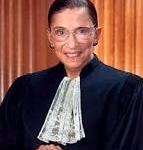When Supreme Court Justice Ruth Bader Ginsburg was asked what amendment she would most like to see added to the U.S. Constitution, she replied, “it would be the Equal Rights Amendment. I think we have achieved that through legislation, but legislation can be repealed, it can be altered,” she continued. “So I would like my granddaughters, when they pick up the Constitution, to see that notion — that women and men are persons of equal stature — I’d like them to see that that is a basic principle of our society.”
Although more than 80% of countries gender equality in their constitutions, including, as Ginsburg noted “every constitution written since he Second World War” — the period during which most of the world’s constitutions were written — the world’s oldest written constitution does not include this protection. In effect since 1789, t U.S. Constitution was written during a period when gender equality was far from being animportant societal value. Over time, the US has passed many laws protecting women’s rights but, as Ginsburg observes, “Legislation can be repealed. It can be altered… That principle belongs in our Constitution.” The U.S. Constitution is exceedingly difficult to amend, however the ERA was nearly added to the Constitution forty years ago. The Amendment, which was originally drafted by suffragist Alice Paul in 1923, was approved by both houses of Congress and endorsed by then President Richard Nixon in 1972. It then went to the states for approval, but ultimately only received 35 of the 38 state ratifications needed to become a Constitutional Amendment. Today, there is renewed interested in an Equal Rights Amendment, which, according to Ginsburg, would recognize that “women are people equal in stature before the law.” Many older women’s rights activists observe that young people are often shocked to learn that the Constitution does not guarantee equal rights for women; in fact, one survey found that 72% of adults incorrectly believed that the Constitution included such a gender equality guarantee. Whether Justice Ginsburg will see the passage of the ERA in her lifetime is uncertain but she says it’s an essential part of ensuring women’s equal protection, observing that a “prime part of the history of our Constitution is the story of the extension of constitutional rights to people once ignored or excluded.”

